Electric drills: device, types, selection and rating
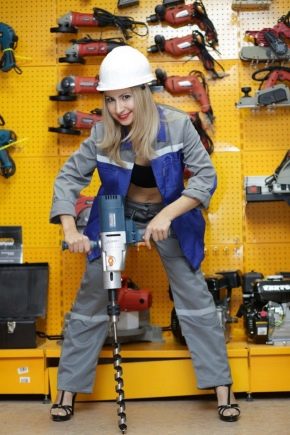
Probably, every household has an electric drill. This is one of the most basic tools you need from time to time to hang a picture, a shelf, fix furniture, or do some other household chores. Today we will look at the device of the drill, its main varieties, and also present the most popular models.

Device
Every good owner has a set of household tools that he needs to carry out repair and construction work around the house, as well as in the country and the local area. Someone purchases only the most necessary tools. and someone buys up everything that is in the hardware store. In any case, a drill is always in the arsenal of a home craftsman, since without this tool, many works cannot be performed.

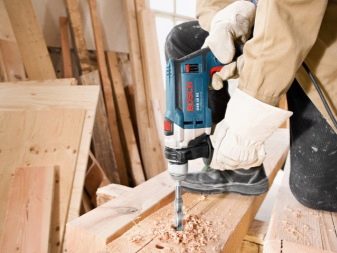


Technically speaking, an electric drill is a portable tool that is used to drill holes in walls and other horizontal and vertical surfaces. In addition to its basic function, the drill is often used as a screwdriver or construction mixer. The basic unit of the drill is the electric motor, which rotates the drill in the workpiece. It is located in a plastic case, the working tool is usually in the hands of the user, so a person must be as reliably protected as possible from electric shock. That is why increased electrical insulating requirements are imposed on the materials from which the body is made.
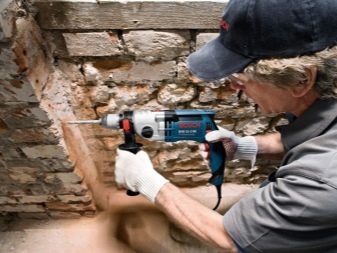



Any electric drill has a gearbox, this is a special device through which rotational motion is transmitted from the electric motor to the drill. Its tasks include reducing the speed, which leads to a slowdown in the rotational speed of the drill, as well as an increase in the torque of the power tool. A special chuck is located on the shaft of such a device, which is needed to fix the drill and other working nozzle. If the gearbox is located in the inside of the housing, then the cartridge, on the contrary, is on the outside.


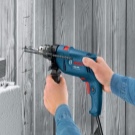



Views
There is a wide variety of drills with a wide variety of operational features: small and large, handheld, electric, cordless and many others. Depending on the purpose of the tool, there are household and professional drills. The latter have a much higher working resource than household ones, since a professional drill is usually used for quite a long time, while a household drill is taken out of the toolbox only from time to time. Accordingly, the prices for a professional tool are much higher than for a household one.

Depending on the principle of operation, a distinction is made between percussion and non-percussion models.
In a hammerless tool, the movement of the electric motor is transmitted through the gearbox, due to which the angular velocity of rotation decreases, and the rotational moment, on the contrary, increases. These drills are optimal for drilling holes with high accuracy, they are optimal for working with metals, plastic and wood, but for drilling concrete, also brick or stone, such a tool is not suitable, since the load on the mechanism increases, and the efficiency is almost zero.

Impact models are renowned for being quite easy to drill holes in concrete surfaces., they usually combine the tasks of a standard drill and a hammer drill, having 2 main working modes - hammering and standard drilling. It is necessary to pay attention to the fact that the percussion mode in any drill is considered non-leading, with frequent use it leads to a rather rapid wear of the tool, therefore, in the total duration of the drill, the number of works in the percussion mode should not exceed 25%. It should be understood that such a drill should not be used to form holes in reinforced concrete products, since this causes increased recoil on the working gears, as well as tool ratchets, which can serve as their proven failure.

Drill-screwdriver - a kind of hybrid that combines the options of a drill and a screwdriver, usually they are supplemented with mechanisms that allow hammer drilling. The advantages of this model include the ability to work without being connected to an electric current, as well as the ability to reverse the direction of movement of rotational elements.

Angle drills are a variety of power tools that are used to drill holes in corners in those areas where it is not possible to get close with a simple drill. Such features are due to the special structure of the gearbox, although the scope of application of such drills is rather limited - it is not used in working with surfaces, in addition, the hammer drilling mode cannot work in it.

Drill mixers are used during construction work to mix solutions of dry mixes. They include a fairly powerful electric motor, which creates a significant torque, and therefore are equipped with additional handles, which are necessary to hold the device during operation. Usually they have 2 main rotation speeds and are equipped with several types of nozzles, which are used for mixing different building mixtures. Even paints and varnishes, glue, putties, as well as cement and lime mortars are mixed with the help of mixers. As for the basic drilling function, this tool is designed to work with ICE, chipboard, wood, drywall and thin iron.

Mechanism for diamond drilling - this modification is equipped with a heavy-duty motor, thanks to which it allows you to create holes in the strongest and hardest materials with the help of diamond light. Typically, such systems are equipped with overheating protection and are used to interact with reinforced concrete and hard stones. Depending on the method of power supply, drills are divided into wired and cordless. The former work only when connected to an AC mains, while the latter operate on a battery.

Differences between professional and non-professional
Professional tools differ quite significantly from household ones, they are used in a mode of intensive workload, therefore, they are distinguished by greater hardness, strength and reliability of structures. The distinctive characteristics of professional tools include:
- the presence of a two-speed rhythm of work;
- an ergonomic handle with a comfortable grip - this allows you to work with the drill for a rather long time without fatigue and fatigue;
- intended purpose - as a rule, professional drills have limited functionality, each model is designed to perform a specific range of tasks for the repair and decoration of the premises;
- possibility of use in conditions of high humidity, dusty and temperature fluctuations.
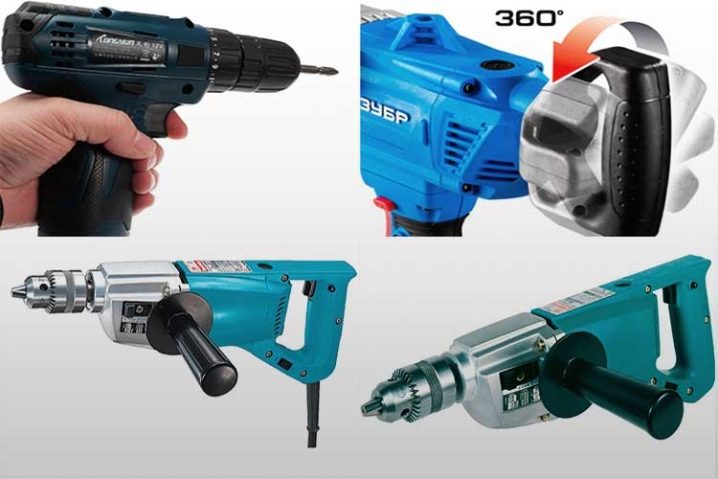
Household drills are characterized by an optimal balance of price / quality, as a rule, they are equipped with a large number of various attachments for use in several directions, while such models are not intended for long-term use, it is recommended to use them for 15-20 minutes, after which they need the same by the duration of the break. Such limitations are explained by the low power of the engine, as well as poor protection against overheating, mechanical stress, water and dust particles.

Selection criteria
Before choosing an electric drill, first of all, you should determine for yourself the amount of work that the tool will have to face. If you plan to use it intensively, then you should give preference to professional models, since household appliances with frequent use will not last long. But for an ordinary apartment or a private house, where the tool is used rarely and little by little, there are more than enough household options.

Special attention should be paid to the technical parameters of the product. One of the basic characteristics of functionality is power, drilling diameter and number of revolutions. The number of revolutions is measured at idle speed. This parameter indicates the technical ability of your drill to work with different types of surfaces. The higher the value, the better. This indicator is especially relevant in the case when you have to work with grinding attachments, surface cleaning and polishing devices, since in this case the load on the drill will be increased.

The power of an electric drill usually varies from 300 to 1500 W, this indicator allows you to determine how quickly and easily you can complete certain construction work. As a rule, a tool with increased power has great functionality, for example, it allows you to drill holes of fairly large diameters. However, for domestic use, a power of 500 W will be quite enough - such a tool can work both with wood and with some other soft surfaces.

The ability to adjust the speed is another indicator of drill performance, although not the most important. It is made due to the work of a special regulator and significantly increases the degree of usability of the tool. So, to twist the screws, you can set a reduced speed of work, but when drilling a hole in strong materials, it is better to set the maximum speed.

Be sure to pay attention to the maximum hole diameter, otherwise you can burn the tool pretty quickly. If you work in accordance with technical conditions and GOSTs, then the tool will serve you faithfully for a long time.
Rating of the best models
The most popular of a wide range of professional tools is the electric drill. Makita... Products of this brand are distinguished by high build quality, their body is made of high quality plastic, and the nozzle is securely attached due to the keyless chuck. The power of such a tool starts from 500 W and more, while, depending on the model, the drilled holes can be up to 4 mm in diameter.

Russian-made tools are in high demand among ordinary consumers "ZUBR", which are designed to work with concrete and brick. This possibility is due to the combination of impact and rotary modes of use, and the ZUBR drills are equipped with keyless chucks, which makes them quite easy to change. The assortment of this manufacturer includes a series of high-quality drill-mixers that operate in a shockless mode and are used for mixing liquid mortars. The torque is quite high, so the tool allows the formation of holes of a fairly large diameter.

It is noteworthy that "ZUBR" is equipped with an option for electronic adjustment of the degree of rotation, due to which the mixer works without scattering building mixtures, and thanks to the metal body, the dimensions of the transmission are distinguished by true geometric accuracy. Instruments in this series cool down quickly, so they can be used in a more natural way. The presence of these undoubted advantages distinguishes the ZUBR favorably from the models of its competitors, the tool is focused on household use with intermittent operation.

Operating rules
When working with a drill, it is very important to comply with safety requirements, if you neglect the rules of work, you can get quite serious injury. Before use, be sure to study the instruction manual and become familiar with the basic rules of work. It is very important to constantly monitor the type and condition of the cable, as well as inspect the sockets and plugs. They are not allowed any damage to the integrity of the insulating coating, plugs and sockets must be free of chips and cracks, and the cord must not have traces of abrasion.

It is important to avoid the ingress of water and other liquids on the working tool.as well as a plug and socket and cable - this often causes serious electric shock. When working with hard concrete surfaces in shock mode, it is advisable to wear headphones to reduce the strain on the hearing organs. If you are drilling substrates with a high degree of hazardous dust, it is advisable to use protective goggles and respirators. When reaming large holes, as well as when working with attachments, an additional ergonomic handle must be used. When replacing drills, turn off the access to electric current - that is, remove the plug from the socket.

It is very important to follow all the rules for the safe use of the drill, as violation of them can lead to quite serious injuries.
Possible problems
Regardless of the product of which functionality and manufacturer you purchased, some malfunctions may occur after a while. The most common are the following:
- breakdown of the stator or armature, which lead to failure of the electric motor;
- high degree of wear of the brushes;
- bearing problems;
- breakage of the speed control button;
- at the start button, working contacts are often oxidized or burned out;
- the chuck holding the drill periodically breaks - the reason for this is usually the wear of the jaws.

If you intend to repair the electrical appliance on your own, you should first carry out a full diagnosis, in most cases the problem is solved by simply replacing the part with a new one. If it is not possible to establish the cause of the malfunction, it is worth contacting the service center.
For information on how to fix a drill with your own hands, see the next video.













The comment was sent successfully.